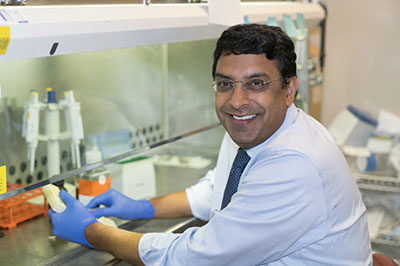Researchers at the Children’s Heart Program at the University of Maryland Medical Center, under the direction of Sunjay Kaushal, M.D., Ph.D., are leading studies to address hypoplastic left heart syndrome (HLHS), a life-threatening congenital heart condition in newborn babies. If left untreated, HLHS is usually fatal in the first weeks of life.

Currently there is no cure for this devastating condition; but, by way of two new clinical trials, Dr. Kaushal, associate professor of surgery at the University of Maryland School of Medicine and co-director of the Children’s Heart Program, the University of Maryland Children’s Hospital, and its team are preparing to take a major step to improve – and possibly save – the lives of our tiniest patients.
For the first time in this country, Dr. Kaushal will lead a Phase I clinical trial using allogeneic mesenchymal stem cells as a way to strengthen the right, stronger side of the patient’s heart. The condition leaves the left ventricle underdeveloped, not strong enough to function correctly and properly circulate blood. The hope is that this treatment will increase the baby’s chances of survival as HLHS limits the heart's ability to pump blood from the heart to the body despite three different surgical interventions.
Dr. Kaushal has also been named the primary investigator in a study that will explore the use of CAP-2003 (cardiosphere-derived cell exosomes) in HLHS patients. CAP-2003 is made by Capricor Therapeutics, Inc., a clinical-stage biotechnology company that was awarded a $4.9 million grant from the National Institutes of Health to apply CAP-2003 in treating HLHS.
